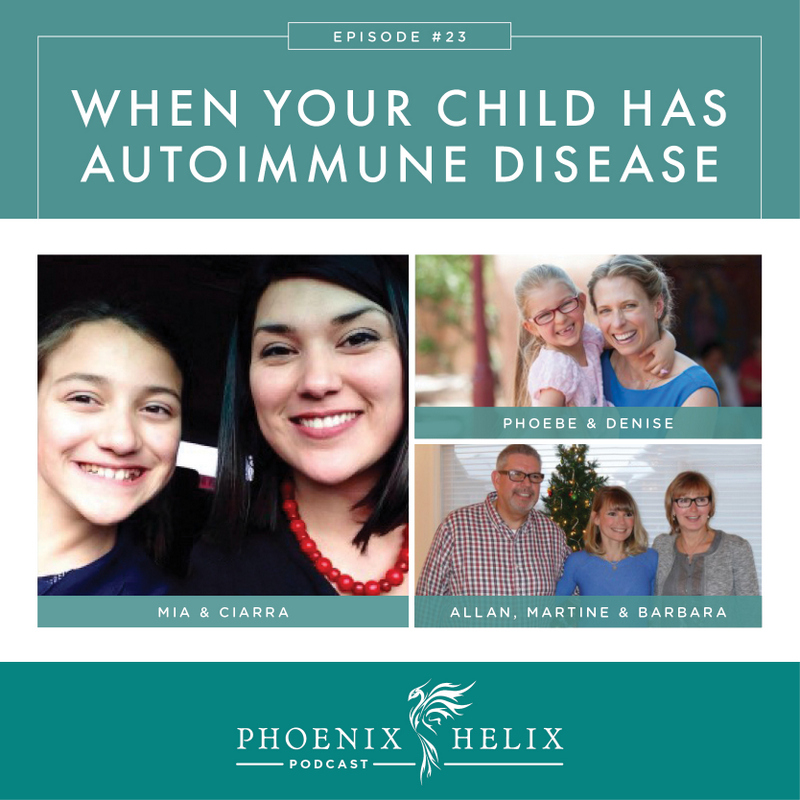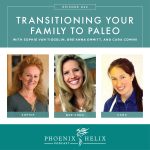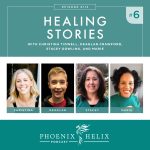Navigating One of Life’s Toughest Moments
This is a heartbreaking topic, but one that’s happening more and more frequently. We all know that it’s a terrifying moment to receive an autoimmune diagnosis yourself. To receive one for your child is simply overwhelming. It’s natural to feel helpless and unsure of what to do. We want to protect our children and usher them into a beautiful life. How do we do this in the middle of chronic illness?
I invited 4 parents onto the show today, who have walked this path already. They share their experience and their advice for new parents facing this situation.
Listen to the Show
- Subscribe to my podcast through your favorite podcast app: iTunes, Stitcher, Google, TuneIn, Spotify, Amazon, etc.
- You can also listen to the episode right here through the player below, and if you subscribe to my newsletter you’ll get notified of future episodes.
Podcast: Play in new window | Download
Show Notes
- Intro (0:00)
- Ciarra’s Daughter: Hashimoto’s (1:40)
- Ciarra’s own healing story: She was diagnosed with hypothryoidism at age 15 and Hashimoto’s at age 31. She had to fight for testing and diagnosis; her doctors dismissed her symptoms as hypochondria. A paleo diet focused on nutrient density has improved her symptoms significantly, which has been a very empowering experience.
- Her daughter Mia was diagnosed with hypothryoidism at age 9 and Hashimoto’s at age 10. Her symptoms were exhaustion, digestive distress, puffy eyes, emotional outbursts, social problems, and bodywide aches and pains – all in spite of being on an 80/20 paleo diet. Thyroid medication combined with tightening up her daughter’s diet and lifestyle alleviated the symptoms.
- Ciarra didn’t force new rules on her daughter. Instead, she taught her about how autoimmune disease works in the body. She encouraged her to pay attention to how her choices affected her symptoms, and let her make mistakes and learn from them. Now, her daughter makes healthy choices most of the time.
- Hashimoto’s often develops in early to mid-puberty. The symptoms can be very wide ranging, so Ciarra simply recommends looking for a big change in your child’s appearance or behavior, where they don’t seem like themselves. In that case, consider testing.
- Letting her kid “be a kid” and spend time playing outside every day, is one of the healthiest things she can do. It’s healthy for parents to do the same.
- Her advice for parents is to take the time they need to educate themselves before making major changes to the family’s diet and lifestyle. Autoimmune healing is a lifelong journey – you don’t need to change everything overnight. Resources: My Blog Store has my recommended paleo books, convenience foods, and cooking ingredients. Also listen to the recent Podcast Episode 22 – Transitioning Your Family to Paleo.
- Ciarra Hannah is the blogger behind Popular Paleo and the author of The Frugal Paleo Cookbook. She also has a series on her blog: Your Child Has Hashimoto’s…What’s Next?
- Allan and Barbara’s Daughter: Crohn’s (26:45)
- Martine Partridge is the author of the cookbook, Happy Nomming. She was diagnosed with Crohn’s disease 20 years ago, at age 15. She shared her healing story with us in Episode 14 of this podcast. Her parents join us today to share their side of the experience.
- Martine’s first symptom was fatigue. Their family doctor did some testing and discovered anemia and blood in her stool. He referred her to a pediatric gastrointestinal specialist, who performed both a colonoscopy and endoscopy which resulted in the Crohn’s diagnosis. They were all shocked. Until that point, Martine had rarely been sick, and there was no family history of Crohn’s.
- They were told there was no known cause and no known cure. So, the Partridges took Martine to another doctor who specialized in alternative medicine. He put her on a gluten-free/dairy-free diet and prescribed probiotics and digestive enzymes. She improved dramatically and went into remission. The doctor then recommended they reintroduce these foods back into her diet. Unfortunately that took her out of remission and sent her into a life-threatening flare that put her in the hospital at the age of 17. The doctors at that point recommended complete removal of Martine’s colon. Her parents felt that should be a last resort, rather than something to do at age 17, without trying other interventions first. So, when her condition stabilized, they took her home and started her on the Specific Carbohydrate Diet (SCD), combined with doctor-prescribed medications.
- Over the years, they combined conventional and alternative approaches to help Martine heal. Medication alone achieved short-term improvement, but then Martine’s health would regress again. Combining the SCD Diet with medication is what moved her health forward. Elaine Gottschall, the author of Breaking the Vicious Cycle, was an active support for them. She recommended they continue the medications prescribed by the doctor, follow the SCD Diet 100%, and when her last symptom disappeared, try to wean her off the medications. That’s what they did, and it took 7 years. They tracked her progress month by month, rather than day by day, but today – 20 years later – Martine still has her colon.
- Barbara and Allen switched to the SCD diet alongside Martine, and went out of their way to make delicious food that wouldn’t feel restrictive. They re-created family recipes with new ingredients. Here are some family favorites: Oven-Baked Apple Pancakes and Marshmallows 3 Ways.
- Denise’s Daughter: Juvenile Rheumatoid Arthritis and Uveitis (45:34)
- Denise’s daughter Phoebe was diagnosed with Juvenile RA at the age of 3, and Uveitis shortly thereafter. Her first symptom was sore knees which caused her to limp in the morning, but then she’d be running in the afternoon, so Denise assumed it was growing pains. She has since learned this is a classic symptom of Juvenile RA. When the limping got worse, she brought her to the doctor, which resulted in the diagnosis.
- Since Phoebe was 3, she didn’t tell her the diagnosis, since she wouldn’t have understood what it meant. Instead, she talks to her daughter about the things they are doing to help her feel better. She uses the language of healing.
- The first year after diagnosis was very emotional for Denise as she searched for answers for her daughter. The first thing she did was get a referral to a pediatric rheumatologist. Next, she worked with an holistic practitioner using techniques such as homeopathy and reiki. She also implemented dietary changes right away. Now, 3 years later, they follow The Wahls Protocol. Resource: Denise mentioned soaking and dehydrating nuts to make them easier to digest. Here are instructions.
- Phoebe has alternated between remission and flares during the past 3 years. Denise is now pursuing treatment for latent viruses which might be causing the intermittent flares. She’s working with Antony Haynes. She learned of his work through The Autoimmune Summit.
- Her advice to parents is “trust your gut”. You know your child better than anyone. Do you best to balance the emotions of the journey, with education about your child’s illness and the treatments available. Make the best decisions you can, and never give up. Also, connect online with people who understand. Resources: The Wahls Protocol Facebook Group and The Paleo Approach Facebook Group.
- Like Martine’s parents, she follows the same diet as her daughter and goes out of her way to find recipes that allow her daughter to enjoy treats on occasion, like coconut milk ice cream or cupcakes for birthday parties.
- Denise Balyoz is the former blogger behind The UK Mama.
- Outro (1:01:19)
- Eileen (your podcast host) is the author of multiple books, written to help people thrive with autoimmune disease. Learn more on the Books Page.
- If you like this podcast, follow or subscribe through your favorite podcast app. You can also subscribe to Eileen’s biweekly newsletter.
- Check out the entire archive of podcast episodes.
You May Also Be Interested In
Spreading the Word
If you like the podcast, please leave a positive review in iTunes. It would mean the world to me, and also helps others find the podcast. Here are some quick instructions using your iPhone:
- If you are already subscribed to my podcast: (1) Click the purple podcast icon. (2) At the bottom of the screen, click Library. (3) At the top of the screen, click Shows. (4) Click the Phoenix Helix podcast image. (5) Scroll down the page, and you’ll see Ratings and Reviews. Scroll down a little bit more and click on Write a Review. This will bring up the review screen. Tap 5 stars (if you love the podcast), and then click in the title box, and it will bring up the keyboard. Enter a title and short review. (6) Click Send in the upper right corner. (7) Thank you! Positive reviews give the podcast a higher search ranking in iTunes, helping people find it and letting them know it’s a quality podcast and worth their time to listen.
- If you haven’t subscribed to my podcast: (1) Click the purple podcast icon. (2) In the lower right corner, click the magnifying class. (3) Type Phoenix Helix in the search box. (4) Click the podcast cover in the Show list. (5) If you’d like to subscribe, click the + sign at the top of the screen. (6) To write a review, scroll down the page, and you’ll see Ratings and Reviews. Scroll down a little bit more and click on Write a Review. This will bring up the review screen. Tap 5 stars (if you love the podcast), and then click in the title box, and it will bring up the keyboard. Enter a title and short review. (7) Click Send in the upper right corner. (8) Thank you! Positive reviews give the podcast a higher search ranking in iTunes, helping people find it and letting them know it’s a quality podcast and worth their time to listen.









I so wish more people would address the uveitis aspect of their autoimmune diseases, if they experience it. It seems to be glossed over in favor of the other disease symptoms (like those in RA), and it has been frustrating, because my teenage daughter has intermediate uveitis and has been tested for everything… EVERYTHING… else, and multiple doctors and multiple medical centers can find no underlying condition (“Idiopathic uveitis”). I was hopeful that this podcast was going to mention it, and any dietary successes addressing it, but sadly, it didn’t. I wish more people would share their experiences with it, as it is frightening and sight threatening yet rarely gets mentioned. We use the autoimmune paleo approach, but after 10 months, her gut issues have gone away, but some ocular inflammation remains, which has to be treated with steroids. There’s just not enough info out there about healing this condition with diet. 🙁
Kel, I understand your frustration when seeking a permanent solution for your child. It’s scary to watch the person you love the most, suffer. One thing I want to clarify is that diet isn’t a cure for any disease – uveitis or otherwise. It can help reduce the inflammation and address the root cause, but autoimmune disease is complex and there is no one-size-fits-all solution. In this podcast, Denise did talk about her daughter’s uveitis in addition to her RA and how she’s trying to treat both conditions. In podcast episode 24, Freyja also talked about her uveitis experience (independent of other conditions). That said, every patient experience is different. If you have hit a plateau in your daughter’s healing, I recommend working with a functional medicine practitioner. I recommend trying Anne Angelone. She has uveitis herself (in addition to ankylosing spondylitis), so she will be able to empathize personally as well as help professionally. She works with patients worldwide via Skype. You’re a wonderful mother, and it can be overwhelming to have a child with a serious illness. I wish your daughter wellness, and I’m sending strength and support your way.
Thank you, Eileen! We are working with a functional med practitioner as well as other doctors. I will look into Anne Angelone. Trying to find the root cause has been frustrating and difficult. I listened to the podcast and heard little mentioned about her daughter’s uveitis, though I did hear her mention the RA for the most part, and her use of the Wahls Protocol and their current use of a mostly Paleo-type diet. But I guess in dealing with the ins and outs of this and the unknown nature of it, I wish for more details from those who are experiencing it. I will look into episode 24, but I’m thinking I may have listened to that one already. So many have experience with anterior uveitis, and my daughter’s is a different type. Thank you for the information.
What a great episode. I especially enjoyed Allan and Barbara’s sharing. What a delightful pair! What a blessing to hear their story!
Thanks, Liz. I’m so grateful to all the parents. I’m sure that was a hard memory for Allan and Barbara to revisit, but they really wanted to help new parents facing the same fears.